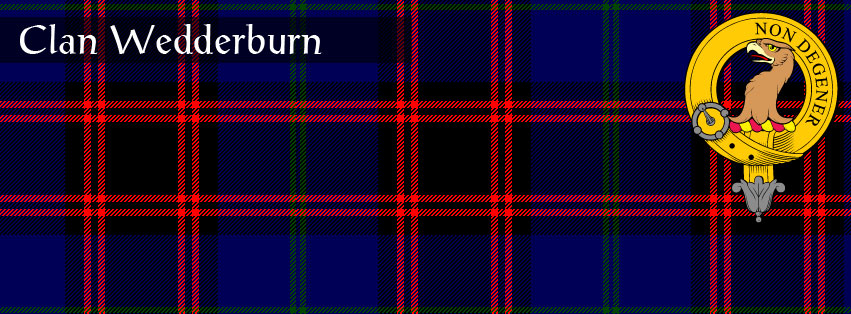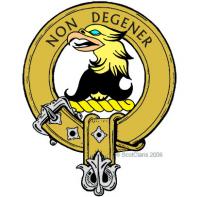
Clan Wedderburn
Wautier de Wederburn pledged his allegiance to England’s Edward I by putting his name, along with a number of other Scottish nobles, to the Ragman Roll in 1296. This made him the very first Wedderburn to be recorded in Scotland. There are records of a John de Wedderburn, known to have been alive in 1364, and a William de Wedderburn between 1426 and 1452. Clan Wedderburn’s lands traditionally lay in Berwickshire; however, they passed to the principal family of Clan Home at a relatively early date. The family then seemed to settle in and around the Forfar area. By the beginning of the 15th century four distinct branches of Wedderburns existed in Dundee and Kingennie in Forfar.
James Wedderburn, from one of the Dundee Wedderburns, had three sons, James, John, and Robert. These men were amongst some of the earliest Protestant reformers in Scotland. They joined to create the famous Guide and Godlie Ballads, also known as the Wedderburn Psalms. James Wedderburn, a descendent of the eldest of the three sons, was Bishop of Dunblane in 1636. He was friends with Archbishop Laud who was one of those responsible for introducing a new liturgy to the Church, and because of this he was forced to flee Scotland. He settled in Canterbury where he died, and is buried at Canterbury Cathedral.
David Wedderburn, from one of the Dundee Wedderburn families, had a grandson called Sir John Wedderburn. He had served in the British Army and was a supporter of the Government during the 1715 Jacobite uprising. John died in 1723 making that Dundee Wedderburn family extinct through the direct male line. He had sold Blackness Castle to Sir Alexander Wedderburn, his cousin, who also went on to succeed the baronetcy. Sir Alexander was the Clerk of Dundee, but he was removed from office for being sympathetic to the Jacobite cause. His eldest son and grandson fought on the side of Bonnie Prince Charlie in 1746 at the Battle of Culloden. Wedderburn and his son fought as a volunteer in Lord Ogilvy’s regiment. Wedderburn senior was taken prisoner after the battle and was later executed for treason, whilst the son fled to Jamaica. The family lost the baronetcy.
Sir David Wedderburn of Balindean succeeded to the cheifship of the clan. Sir David was the MP for the Perth constituency, and was also Postmaster-General for Scotland. He was made a baronet in 1775. The great-grandson of noted judge, Sir Peter Wedderburn of Gosford, distinguished himself in law, and became Solicitor General for Scotland. He actively spoke out against the government’s policies regarding the colonies in America, and even correctly predicted their quest for independence from the Empire. In 1780 he was created Lord Loughborough, and 21 years later the Earl of Rosslyn. Wedderburn died without a male heir, and so his nephew, Sir James St Clair Erksine, inherited the earldom.
The Scrymgeour-Wedderburn Earls of Dundee now hold the chiefship. It is arranged that the eldest son of the Earl would hold the role of chief of both Clan Wedderburn and Clan Scrymgeour, rather than the Earl himself.
The current chief, and heir to the Earldom of Dundee, is Henry David Scrymgeour-Wedderburn Lord Scrymgeour.





